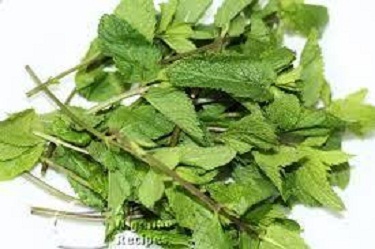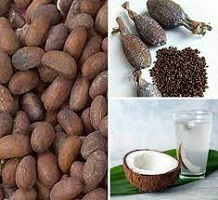Health Benefits of Scent Leaf, Uses, and Side effects
Health Benefits of Scent Leaf, Uses, and Side effects. Please watch >>>>

- Preferred Common Name: African basil
- Botanical Name: Ocimum gratissimum
Related >>>>>
- Scent leaf and kidney: Can Scent Leaf Clean kidneys?
- Scent Leaf for Fertility: How to Boost Fertility with Basil Leaf
- Health Benefits of Scent Leaves, Uses, and Side effects
- Scent Leaf for Ovulation: How to Prepare Scent Leaf Tea
- Scent Leaf and Ovulation, Menstruation and Fertility
International Common Names
- English: clover basil; East Indian basil; shrubby basil; tree basil
- French: basilic sauvage; menthe gabonaise
- Chinese: wu mao ding Xiang Luo le
- Portuguese: alfavaca-de-caboclo; alfavacão
- Spanish: albahaca Africana; albahaca cimarrona; albahaca de limón
- Local Common Names
- Brazil: alfavaca brava
- Cambodia: ling leak kranam
- Cuba: albahaca de clavo; canela; clavo; clavo mondonguero; laurel cimarrón; orégano cimarrón
- India: ajeka; doshakleshi; elumiccam tulaci; elumichanthulasi; kattuthrithavu; mali-thulasi; perumthulasi; ram tulsi
- Indonesia: kemangi hutan; ruku-ruku rimba; selaseh mekah
- Jamaica: African tea bush
- Lesser Antilles: basilic; frond bazin; mint
- Malaysia: ruku-ruku hitam; selaseh besar
- Netherlands Antilles: anis; yerba di hole blanku
- Dominican Republic: albahaca vaca; atiyayo
- Haiti: basilic à petites fleurs; basilic grandes feuilles; folle basin; fombasin; gran basilique; grand basilique; grand fombasin
- Nigeria: nchuanwu/ Ahuji (Igbo); efirin (Yoruba); daidoya (Hausa)
- Panama: origanum de castilla
- Thailand: horapha-chang; kaphrao-chang; yira
- Vietnam: é lá lớn; hương nhu trắng
Health Benefits of Scent Leaf ~ an Overview
Scent leaf, also known as Ocimum gratissimum or basil is a native of Ghana, Nigeria, and other regions of Africa and Asia. It is the most prevalent member of the genus Ocimum and comes from the family Labiatae.
Description
It can reach a height of 1-3 m and has numerous branches that sprout from its base.
The flowers have fragrant spikes of white to greenish-yellow flowers that are lanceolate in shape and taper at both ends.
Due to its aromatic taste, this native shrub is mostly used as a spice for culinary delights and may be found on farms and gardens.
Every meal has this flavorful, distinctive spice for vegetables, which also imparts a sweet aroma
A significant part of the treatment and prevention of illnesses and infections is performed by fresh basil leaves.
Additionally, it contains crucial bioactive components for human health like iron, phosphorus, calcium, and vitamin A.
The many tribes in Nigeria frequently consume this scent leaf. It is referred to as “Efirin” in Yoruba, “Ahuju” or “Nchanwu” in Igbo, “Ganyen Kamsh” or “Doddo Ya” in Hausa, “Aramogbo” in Edo, “Ntonng” in Ibibio, and “Ekeni” in some Ijaw dialects.
General Characteristics of Scent Leaf Benefits
A decoction of the plant’s leaves and blossoms is used to combat hot temperatures in India, where it is particularly well-liked.
Up to 99% of the bacteria that are present in our mouths can be eliminated by this natural healer.
If there are ulcers, it heals them perfectly. Therefore, stomatitis and angina are treated with infusion or decoction.
The same techniques can be used to treat toothaches. Dental calculus also occurs with caries. Gum can be made stronger by a decoction or infusion.
The smell of leaf manages a headache thanks to a few ingredients. And of many origins. Whether it be a cold, migraine, or high blood pressure.
A scent leaf infusion is used as an antitussive, particularly for whooping cough. Other pulmonary ailments have been linked to scent leaves. Even the treatment of tuberculosis involves it.
The scent leaf contains elements that have the power to damage harmful cholesterol. Kidney stones can be fought with the use of fragrance leaves.
Uses – Healing Powers of Scent Leaf (Ocimum gratissimum)
Tea made from scent leaf has been used as a treatment for digestive issues, including gastroenteritis. Cold and flu symptoms can be reduced by chewing on the leaves.
The leaves can be boiled with honey or ginger to cure bronchitis, cough, colds, and influenza.
Scent leaf juice, when squeezed, can be consumed to stop stools from coming up.
The best results can be obtained by adding salt or lime, which improves the taste and reduces unneeded bowel movements.
The local dish “Ofe Akwu,” pepper soups, porridge yams, jollof rice, “Ukwa,” and many others call for it as an ingredient. The Benin people utilize it much more to prepare soups like “Ogbono” and “Egusi.” It is best known for producing a variety of delicacies.
Scent leaves may act as a mosquito repellent when burned after drying. The plant’s seeds can be infused to treat gonorrhea and urinary tract infections, as well as used in vaginal douches to treat vaginitis.
The Advantages of Scent Leaves for Health
The smell leaf is well-known for its health benefits in addition to its appealing perfume. Calcium, phosphorus, iron, potassium, and vitamin A are all abundant in them.
The scent leaf is also known as the “fever” leaf because its oils are thought to have some antiseptic, antifungal, and antibacterial effects.
Do you ever wonder why, when cold attacks, people consume pepper soup and scented leaves?
It does so because it combats the common cold and catarrh. Additionally, it can be used to treat digestive diseases including cholera and dysentery.
It works well for skin care and treats skin diseases like ringworm when ground into a paste. Tea made from it can be brewed to ease the pain of menstrual cramps.
According to research, eating fragrance leaves has a lot of advantages. High in nutrients, scent leaf is also a well-known fertility enhancer.
Health Benefits of Scent Leaf Continues
It is rich in vitamin A, which helps to promote good eyesight. Scent leaves help to prevent xerophthalmia when ingested in sufficient amounts.
Its contents, which include calcium and magnesium, raise blood circulation, lower bad cholesterol, and enhance heart health.
Scent leaf tea is excellent for shedding pounds.
The aromatic leaf assists with the intestinal movement have a relaxing effect on the stomach and speed up food digestion.
In addition to lowering blood sugar, it can shield the insulin-producing pancreatic islets from harm.
Repellents
Houseflies, mosquitoes, and other insects can be repelled by cutting or plucking the plant’s leaves, which can then be distributed in residential areas to lower the number of mosquitoes and houseflies there.
As a result, there is a decrease in the prevalence of malaria infections brought on by these mosquitoes and houseflies. Helps in treating skin infections when crushed and used topically.
Because of its capacity to promote vascular permeability, it is frequently used to treat and cover boils, pimples, and wounds.
It has ingredients like eugenol and epigenin fenkhona that support men’s erections by preserving sperm viability and optimal penile health.
Its adaptability is incredible in addition to its health advantages.
Culinary Benefits
Beans, jollof rice, pepper soup, local rice, stew, peppered chicken, nkwobi, isi ewu, yam porridge, and plantain porridge can all contain scent leaves
Because of this, the majority of homes that are aware of its values may prefer to have it in their residences. Individuals who frequently do this have been shown to hardly ever get sick.
Some people boil, squeeze, and spread it before drinking. Therefore, it is advised that people do not disregard this herb.
Potential side effects of scent leaf
Before consuming, we must be aware that medicinal herbs can be just as potent as prescription medications, which means certain people may need to exercise caution when using fragrance leaves.
It may occasionally cause certain drugs to interact.
Allergy
If you suffer any allergic reactions to plants in the basil or mint family, avoid fragrance leaves.
Blood clotting
The scent leaf contains a lot of vitamin K, which is important for blood clotting.
High quantities of vitamin K in food or supplements can influence how warfarin and other blood thinners work.
Therefore, before increasing their consumption of fragrance leaf or any other variety of basil, anyone using blood thinners should consult a doctor.
Pregnancy
In one promising test conducted in Nigeria, smell leaf (Ocimum gratissimum) leaf extract at high doses was used to induce labor in pregnant women.
Therefore, it is suggested that pregnant women avoid consuming heavy amounts of this herb to prevent premature labor.
Additionally, if you develop hives, swelling, or trouble breathing after consuming anything made with the leaves, call emergency assistance
The Bottom Line about the Health Benefits of Scent Leaf
Ocimum gratissimum, often known as scent leaf, has many vitamins and antioxidants that aid in disease prevention.
Its essential oil is exceptionally rich in phytochemicals that combat bacterial infection, bad breath, skin conditions, and colds.
However, excessive use of fresh fragrance leaf extracts should be avoided by pregnant women and people using blood thinners.
Additionally, more human scientific research is required to pinpoint the precise pathways that fragrance leaf uses to treat illnesses.
FAQs on Health Benefits of Scent Leaf
How should scent leaves be prepared for infection? How is scent leaf used to treat infection?
Numerous antibacterial, antifungal, and larvicidal qualities are attributed to the plants.
In the treatment and prevention of illnesses and infections, scent leaf is important.
Additionally, it contains crucial bioactive components for human health like iron, phosphorus, calcium, and vitamin A.
Health benefits of scent leaves and onions
Calcium and magnesium are both found in scent leaves and onions, and they both work to lower bad cholesterol (low-density lipoprotein cholesterol).
What are the benefits of ginger and scent leaf?
Tea made from scent leaf has been used as a treatment for digestive issues, including gastroenteritis.
Cold and flu symptoms can be reduced by chewing on the leaves. The leaves can be boiled with honey or ginger to cure bronchitis, cough, colds, and influenza.
Is scent leaf good for kidneys? Scent leaf and kidney
It is untrue to say that scented leaves may clean the kidney. There is no proof from science to support the claim
Can scent leaf be eaten raw – Can I eat raw scent leaf?
According to research, eating fragrance leaves has a lot of advantages.
High in nutrients, scent leaf is also a well-known fertility enhancer. It contains a lot of vitamin A, which supports healthy vision.
Scent leaves help to prevent xerophthalmia when ingested in sufficient amounts.
Scent leaf and honey for face ~ Health Benefits of Scent Leaves
Many individuals are unaware of the potent facial plant known as scent leaf.
When appropriately combined with honey, which is known for its healing properties, scent leaf, which is useful in treating skin conditions
What is the benefit of drinking scent leaf water? Health Benefits of Scent Leaves
You can use scent leaf to treat stomach aches, dysentery, diarrhea, and vomiting. It can aid in bloating alleviation and speed up the digestion of meals.
The potential of scent leaf to decrease blood sugar is just one of its incredible health advantages.
However, it can reverse the effects of nicotine and smoking on the body.
What is the English name for scent leaf?
Many names are given to scent leaves. The Latin name for this plant is Ocimum gratissimum; additional names in other dialects are Scent leaves, Clove basil, or tea bush; and Ocimum gratissimum
Can scent leaf help you lose weight? Weight loss and scent leaves
Scent leaf stimulates quicker fat breakdown and a more powerful fat-burning process because of its high enzyme content. This encourages losing weight.
Additionally, the plant decreases excess fluid in the body and removes harmful pollutants because of its diuretic and carminative effects
Here are 8 proven ways to help you lose belly fat in two days:
- Firstly, chew your food properly and chew slowly
- Then, avoid gas-producing vegetables
- After thAT, Consume more Vitamin C
- Perform short bursts of exercises
- Skip sugar altogether
- Limit your carb intake
- Take a 5-minute walk after each meal
- Lastly, get sufficient sleep


